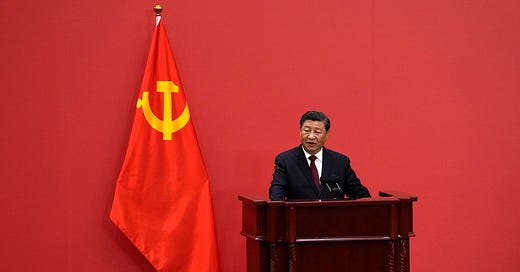Between Tradition and Tyranny: Mongolia's Battle for Cultural Survival
China is intensifying its cultural censorship of Mongolian language and history by banning, and burning, books.
On September 1st, an official ban on the teaching of the Mongolian language in schools went into full effect in the province of Inner Mongolia, a so-called autonomous region in the northeast of China bordering the independent nation of Mongolia. All classes from then on must be conducted in Mandarin Chinese, and parents report being scared or unable to teach their kids at home. On August 25th, a well-regarded history book collection titled A General History of the Mongols by the scholar Mansang Taichuud was banned by the Inner Mongolia Autonomous Region Book and Periodical Distribution Industry Association because it represents “historical nihilism” (that is to say, it doesn’t quite jive with the Chinese Communist Party’s official narrative).
Taichuud’s book and the language ban aren’t the only instances of authoritarian overreach regarding the roughly 6 million Mongols living in China. In 2019, a Mongolian-language high school in the city of Chifeng was investigated for apparently promoting separatism because of Mongolian flags on display in various classrooms. Enghebatu Togochog, director of the Southern Mongolian Human Rights Information Center (based in New York), reports other Mongolian-language books have been taken off shelves, and, in the Inner Mongolia capital of Hohhot, some textbooks are being burned. The notion that Mongols, a culture with a rich, storied history, are proud of their heritage and seem to think of themselves as more Mongolian than Chinese quite clearly bothers the CCP.
Efforts to dampen the practice of Mongolian culture are certainly disturbing, but not at all surprising to anybody familiar with Chinese President Xi Jinping’s ruthless desire to form a core national identity, uniting all of China’s 56 ethnic groups under a common language, history, religion (or lack thereof, in this case - the country is officially atheist), and, most importantly, political ideology. In a 2019 speech, Jinping decreed “[China] should fully implement our plans for ethnic minority groups and the areas they inhabit so that all ethnic groups work together to create a better future and share the new glories and dreams of the Chinese nation.” Jinping goes on to say China needs to “enhance ethnic unity and progress in all areas, [and also] introduce new forms of initiative to government departments, enterprises, communities, towns and townships, schools, military units, and venues for religious activities.”
Sounds pretty fair, and perhaps even noble, right? The blending together of different cultures is part of what makes a country like the United States so enticing. China’s treatment of other ethnic groups suggests they don’t mean “blend together” as they do “smash into a pulp”. The most prominent example of this is the tragic treatment of the Uyghur population in the Xinjiang province. Despite the province accounting for only 1.5% of China’s population, it accounted for 20% of all arrests in China in 2017. Uyghurs are subject to electronic surveillance, are forbidden from fasting during Ramadan, and cannot refuse to eat pork. Many Uyghurs (potentially up to 1 million at a certain point), a predominantly Muslim population, have been forced into “re-education” camps as a means of religious deprogramming and combating supposed terrorism. Former detainees and other witnesses report physical torture, rape, and involuntary sterilization.
While Jinping and the Chinese Communist Party may wax poetic about the desire to integrate China’s unique and distinct ethnic groups into a melting pot (Jinping has even popularized the phrase “Chinese Dream” in a sneaky nod to the fabled American Dream), their records suggest they interpret those ideas less as “integration and diversity” and more as “blind obedience to the state by any means necessary”. One can’t help but wonder the point of such brutality on the part of China. In a nation where 92% of the 1.4 billion population is one ethnic group (Han), why fuss over the remaining 8%? China may cite potential terrorism (in the case of the Uyghurs) or threats of separatism (in the case of the Mongols), but there’s no real evidence to suggest either is an issue. It may be that China’s aging population and declining birth rates require trhe CCP to grasp for as much power as possible before a potentially severe economic decline. Or, perhaps, there’s a much simpler explanation - Xi Jinping is a megalomaniacal dictator who can’t even handle being jokingly compared to Winnie the Pooh. Of course, he has a hard time with people going their own way.
This article was written by Jack Gillespie.





